|
|
|
Sort Order |
|
|
|
Items / Page
|
|
|
|
|
|
|
| Srl | Item |
| 1 |
ID:
114563
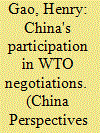

|
|
|
| 2 |
ID:
070460


|
|
|
| 3 |
ID:
074742


|
|
|
| 4 |
ID:
108041


|
|
|
|
|
| Publication |
2011.
|
| Summary/Abstract |
Having recognised that the completion of the Doha Round of multilateral trade negotiations during 2011 is unfeasible, governments and the WTO Director-General are exploring whether a 'downpayment' on the Round could be negotiated before the December 2011 WTO Ministerial Conference. The initial indications are not promising. Worse, as argued here, a downpayment coupled with a retroactive revocation clause are unlikely on their own to change the politics of trade policy in the major trading nations. This makes the signing of the final deal no easier unless something alters the calculus of senior government leaders and establishes a credible end game for the negotiation.
|
|
|
|
|
|
|
|
|
|
|
|
|
|
|
|
| 5 |
ID:
095930
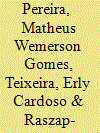

|
|
|
|
|
| Publication |
2010.
|
| Summary/Abstract |
The central themes to be addressed during the Doha Round of the world trade negotiations are the reduction of the agricultural production and export subsidies and improved market access for agricultural and non-agricultural goods. The G-20 group wields enough power to press negotiations at the Doha Round toward lower agricultural trade barriers and production and export subsidies. The objective of this study is to determine the impacts of the Doha Round on the economies of Brazil, China, and India. The Global Trade Analysis Project's (GTAP) general equilibrium model and database (version 7) are used. The Doha Round scenarios simulated in this paper consider the WTO agricultural production and export subsidy reduction requirement, and the application of the Harbinson approach, and Swiss formula to reduce import tariffs. Brazil and China present the highest GDP growth rate varying from 0.4 % to 1.4%. India shows a negative GDP growth rate in all scenarios, except in that which replicates the Uruguay Round. The welfare gains are positive, but small, for Brazil, China and India. The GDP loss observed in the economies of the EU25 and the US may make it difficult to reach a trade agreement at the Doha Round.
|
|
|
|
|
|
|
|
|
|
|
|
|
|
|
|
| 6 |
ID:
113957
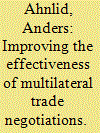

|
|
|
|
|
| Publication |
2012.
|
| Summary/Abstract |
The informal WTO ministerial meeting in July 2008 brought the long stalled Doha Round to the verge of a breakthrough. The reason for its final failure was substantive and not related to the negotiating procedures, which previously had contributed to meager results and failures in the round. The meeting was conducted using procedures that ensured a considerable amount of trustworthiness, transparency and legitimacy, which in turn contributed to effectiveness in the process. Thus, the meeting solved many, albeit not all, outstanding issues on the path towards agreement on so-called modalities for agriculture and industrial products, which in turn would have been necessary for a final successful conclusion of the Round. The 2008 July negotiations demonstrated that complex large-scale multilateral negotiations can be handled procedurally in an acceptable and successful way. The article advances a neglected interpretation of the July meeting, and provides lessons for both future WTO negotiations and multilateral negotiations in other policy areas.
|
|
|
|
|
|
|
|
|
|
|
|
|
|
|
|
| 7 |
ID:
074186
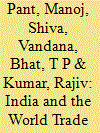

|
|
|
| 8 |
ID:
112089


|
|
|
|
|
| Publication |
2012.
|
| Summary/Abstract |
The World Trade Organization's (WTO) Doha round is in trouble; but so is the way we talk about the institution and the negotiations. Economists, international lawyers, political scientists, practitioners and pundits alike have locked themselves into a deeply constraining and quite unhelpful way of talking and thinking about the WTO that has little to offer either the round or the Organization. Indeed, the way commentators have chosen to talk about the problems of the round, as well as the options for moving forward, may actually be compounding matters, reinforcing the likelihood that Doha will produce little, that future negotiations will continue to be dramatic and hard to conclude, and that inequitable outcomes will persist. My aim here is to shine a light on the bounded nature of the current debate with a view to agitating for a less constrained and more fruitful conversation about Doha, the WTO and beyond.
|
|
|
|
|
|
|
|
|
|
|
|
|
|
|
|
| 9 |
ID:
106641
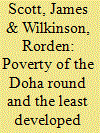

|
|
|
|
|
| Publication |
2011.
|
| Summary/Abstract |
Two distinct literatures have emerged on the World Trade Organization's Doha Development Agenda (DDA) and its likely benefits for developing countries. One is built on the use of computable general and partial equilibrium simulations, while another explores the political economy of the negotiation process to explore the opportunities a concluded round will bring for developing countries. Both literatures generate important insights into the DDA, and both highlight that the deal on offer to developing countries is very weak. However, there has been little engagement between these two bodies of thought. This paper seeks to begin to redress this, fusing a review of the simulations of likely DDA gains with an examination of the passage of the Doha negotiations. It argues that through this process we can arrive at a fuller understanding of how limited, and problematic, the results of the DDA are likely to be for the less developed countries. If the DDA is to deliver on its mandate, a qualitative shift in the negotiations is required.
|
|
|
|
|
|
|
|
|
|
|
|
|
|
|
|
| 10 |
ID:
075083
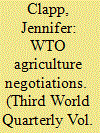

|
|
|
|
|
| Publication |
2006.
|
| Summary/Abstract |
The Doha 'Development' Round of trade negotiations at the wto has featured agricultural trade liberalisation as one of its key aims. But developing countries were frustrated with both the process and the content of the agricultural agreement negotiations early on in the round. This prompted these countries, through a number of developing country groupings such as the G-20 and others, to call for changes in the talks to ensure that developing country voices and concerns were heard. Although developing countries were in many ways successful in registering their concerns in the latter half of the negotiations, and have maintained a fairly high degree of cohesion across the Global South, it remains unclear whether this cohesion will last as the uneven impacts of agricultural trade liberalisation become apparent.
|
|
|
|
|
|
|
|
|
|
|
|
|
|
|
|
| 11 |
ID:
074589


|
|
|
|
|
| Publication |
2006.
|
| Summary/Abstract |
Even before the Doha Round of international trade talks in the World Trade Organisation (WTO) had been suspended in July 2006, there was little sign of progress in the negotiations on the relationship between WTO rules and multilateral environmental agreements (MEAs). If the Round is resumed, this and many other important issues on the WTO agenda will have to take a back seat while the big ticket items-agriculture and market access-are resolved. Meanwhile, governments acting outside the WTO will continue to agree to new MEA commitments that relate to trade policy without a clear understanding of how the design and implementation of those commitments is affected by WTO rules. This article examines some of the options for governments to clarify the relationship between WTO rules and ME As, both inside and outside the WTO. It sets out the nature and experience of the relationship, before examining ways in which governments in the WTO and in the UN system could work towards better global governance of trade and sustainable development.
|
|
|
|
|
|
|
|
|
|
|
|
|
|
|
|
|
|
|
|
|